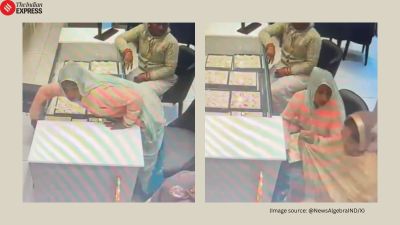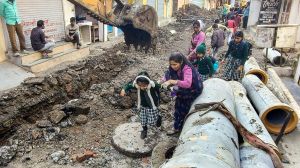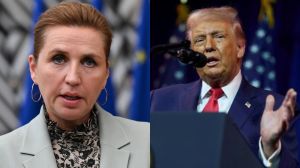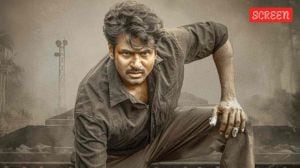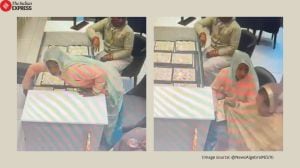Mumbai Police8217;s Sena Block
Gurunath Desai being a popular Sena MLA has got tremendous popular support... there will be rasta roko and other agitations in the event...

Gurunath Desai being a popular Sena MLA has got tremendous popular support8230; there will be rasta roko and other agitations in the event of his arrest8230; public unrest will create tension and invite a serious law and order problem.8221; Juhu police quoted in Express Newsline, March 16.
The same words, the same accused, the same police. Be it Sudhakar Naik8217;s Congress government or Bal Thackeray8217;s Shiv Shahi, when it comes to arresting Shiv Sainiks, Mumbai8217;s police abandon their crush-crime-at-any-cost role and choose to wash their hands off these particular criminals. Never mind the consequences of 8220;letting them loose8221; to quote the Srikrishna Commission report.
Police officers of all ranks testified before the Srikrishna Commission inquiring into the December 92-January 93 communal riots that they did not arrest Shiv Sainiks accused of instigating and participating in communal violence, promoting communal hatred and defying police bans, because they thought the arrests would aggravate the situation. Atleast one officer said that the arrest would have led to an 8220;escalation of communal tension8221; as it would have 8220;hurt the feelings of the accused8217;s followers.8221; The accused: then Sena MLA Madhukar Sarpotdar; the officer: DCP Vasant Ingle. Asked by Justice B N Srikrishna whether hurting the feelings of the accused8217;s followers was the criterion normally followed when arresting offenders, DCP Ingle replied: 8220;Not in all cases. If the person has the potential for trouble, this is a factor8230;It was my perception that Shri Sarpotdar had this potential for communal trouble.8221;
So a person who had the potential for communal trouble was allowed to roam free after leading a banned procession in which abusive communal slogans were shouted and speeches made, at a time when the city was slowly recovering from 8220;unprecedented communal violence8221; to quote the then Police Commissioner S K Bapat and 8220;an undercurrent of communal tension8221; still simmered.
As Sarpotdar himself pointed out to the Commission, some of thecity8217;s seniormost officers escorted this 8220;banned8221; morcha, taken out in Bandra East on December 27, 1992. The other leaders of the morcha: Sena leaders Ashok Shinde, Jaywant Parab, Umesha Pawar.
Not arresting the accused was a collective decision taken by the Investigating Officer, the Sr PI, ACP Sukhtankar and DCP Sanjay Pande, and approved of by the then Police Commissioner. Sr PI Madhukar Zende told the Commission: 8220;Later on, DCP Pande took the decision that, because of the circumstances then prevailing, it would not be necessary to arrest any of the said accused and he passed oral orders that the charge-sheet should be filed against them without arresting them8230;The arrest was deferred not because they were Hindus, but because they were connected with the Shiv Sena.8221; In less than a week, riots broke out again, and while they were on, the honourable MLA led three morchas to the police station. SR PI Zende agreed that 8220;the several morchas led by Sarpotdar and their allegations that police wereonly arresting innocent Hindu boys did indicate to them that the arrests of the participants would make the situation flare up. Not using force, was also part of the tactical decision to ensure that the situation did not flare up.8221;
Sarpotdar was finally arrested on January 14 only after the army intercepted his vehicle during curfew hours and found him in possession of licensed and unlicensed arms a charge of which he was acquitted last year. The arrest was for a few hours only 8211; as anticipated, thousands of his followers blocked the highway and the night magistrate S A Merchant granted him bail Rs 2000, agreeing that not releasing him may create tension in the city. This was when violence was at its peak in the area.
Another rally, another ban. Again the police escorted the 8220;banned8221; rally, again abusive slogans were shouted, but no arrests made, though the Investigating Officer wrote about this rally that the 8220;inflammatory8221; speeches after the rally resulted in communal riots spreadingquickly into different areas the next day. Stones were thrown at namazis from this rally held on December 6, 1992 at Dharavi to celebrate the demolition of the Babri Masjid. The organisers: Sena ex-corporators Baburao Mane and Ramakrishna Keni, and Theresa Killekar. The Srikrishna Commission report describes this rally as the very first serious communal incident in the city. The Sr PI of Dharavi, M Y Ghaghe, told the Commission, 8220;Since the rally when it started was peaceful, any attempt to stop or arrest any of the participants might have also created problems of law and order.8221; Even after the rally, the organisers were not immediately arrested because 8220;considering the tense situation prevailing at that time, their arrests might have created more trouble, and in any case, since they were known accused from the local area, we would have been in a position to arrest them at any time.8221;
8220;Any time8221; came long after the killings in Dharavi and the city had run their course. The 26 accused were formallyarrested after they 8220;surrendered8221; to the police on March 16, 1993, a week after they had got anticipatory bail. By then, three of them had attended peace committee meetings held in the police station. Said Gharghe, 8220;We did not arrest them, because they were the leaders of the Sena within Dharavi8230;I had discussed this matter with ACP Sukhtankar and he had suggested that there should be no immediate arrests, as otherwise, there would be serious repercussions creating law and order problems.8221; The Srikrishna Commission report states: 8220;The government does not appear to have granted the sanction to prosecute the accused at all.8221;
In Kalachowkie, the Sena8217;s stronghold, Shiv Sainiks accused by the police as instigators and participants in several cases of attack on Muslims in January 8217;93 were arrested only in February because, said their SR PI, 8220;soon after the riots ended the situation was still tense and immediately arresting them might have aggravated the situation.8221;
These were not the decisionstaken by officers on the spot. These decisions were taken at the top, even before the demolition, when tension was building up. The then chief of intelligence, Additional Commissioner of Police V N Deshmukh, told the commission that he did not think, even retrospectively, that preventive arrests of senior leaders of communal parties would have made it easier to tackle the riot situation. His senior officers and the government agreed that preventive arrests of leaders and activists of the Sena would have resulted in flaring up of unrest, because of the way Shiv Sainiks had reacted on previous occasions when such preventive arrests had been carried out. The situation in December with the undercurrent of communal tension was taken into account, and in their assessment, it would have erupted into an uncontrollable one if Sena leaders had been arrested.
- 0111 hours ago
- 022 hours ago
- 0311 hours ago
- 043 hours ago
- 0512 hours ago


